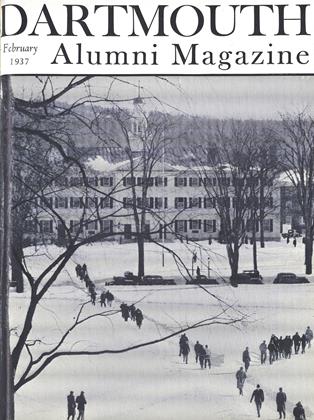By Leon Verriest, Harper & Brothers, New York. p. 276. $1.60.
The complete chronological survey of a modern literature in the form of a manual scarcely existed before the nineteenth century. Since 1825, however, there have been published about two hundred such manuals on French literature alone. Even the greatest of these histories, such, for example, as that of Lanson, assumes for the most part, a familiarity with the texts under onsideration, and hence are illadapted to the needs of the ordinary American student.
Several years ago a successful attempt to remedy this tendency was made in the attractive volume in English, MAIN STREAMS OF FRENCH LITERATURE, by Professor Guyer of Dartmouth College. Now another member of our French Department, Professor Verriest, has produced a manual in clear, readable French entitled L'EVOLUTION DE LA LITTERATURE FRANCAISE. In this new book Professor Verriest makes few assumptions, and besides inserting numerous quotations has summarized many works of the more important French authors. The word Evolution has been kept in mind by the writer, and there is pre' sented to the reader not a mere sequence of literary productions, but an attempt to stress the development and growth of literary forms together with their changing historical and cultural backgrounds. To quote from his preface, "Civilisation, histoire philosophic, sociologie, tout se lie at s'entr'influence, se fond at se synthase dans ce grand tout qui s'appelle L'HUMANISME, at dont la grande porte d'entree est la litterature."
The French language, like all languages, has its own special vocabulary used in literary criticism, and frequently misunderstood by one not versed in the subject. In this text such words are often followed by the English equivalent in parenthesis, or else may be found in a French-English vocabulary at the end of the book. Another original feature to which I should like also to call attention, is the occasional parallel column summing up the essential characteristics of different literary forms, or, in some cases, the important traits of different chronological periods.
On a few rare points the professional scholar might disagree with the author in some of his final judgments, but, even so, he is sure to find in this work many facts that he had not clearly in mind, as well as new and significant points of view. Professor Verriest's hope, as expressed in his preface, above all things to be simple and clear, has found fulfilment in a text which at the same time makes most fascinating reading.
The Civil Service in Modern Government, a study of the merit system, has been published as a pamphlet of 58 pages by the National Civil Service Reform Leagueof New York City. Professor Herman Feldman was a member of the Committee on Education in the Merit System of the National Civil Service Reform League which prepared this publication.
 View Full Issue
View Full Issue
More From This Issue
-
 Article
ArticleGradus Ad Parnassum
February 1937 -
 Class Notes
Class NotesClass of 1911
February 1937 By Nathaniel G. Burleigh -
 Class Notes
Class NotesClass of 1936
February 1937 By Rochard F. Treadway -
 Class Notes
Class NotesClass of 1929
February 1937 By F. William Andres -
 Article
ArticleThe Modern Museum
February 1937 -
 Class Notes
Class NotesClass of 1927
February 1937 By Doane Arnold
Books
-
 Books
BooksAlumni Articles
NOVEMBER 1967 -
 Books
BooksEDITOR'S PICKS
NOVEMBER | DECEMBER 2013 -
 Books
BooksPOLITICS IN FRANCE.
MARCH 1969 By FRANCOIS DENOEU -
 Books
BooksCALCULUS OF VECTOR FUNCTIONS.
NOVEMBER 1962 By H. MIRKIL -
 Books
BooksTHE INTERACTION OF LAW AND RELIGION.
February 1975 By MURRAY SYLVESTER -
 Books
BooksDENMARK ON FIFTY DOLLARS
May 1937 By Raymond W. Jones


